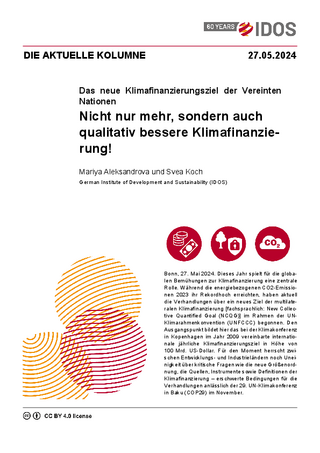The new UN climate finance goal
Why a new quantum must go hand in hand with higher quality
Aleksandrova, Mariya / Svea KochThe Current Column (2024)
Bonn: German Institute of Development and Sustainability (IDOS), The Current Column of 27 May 2024
Bonn, 27 May 2024. This year is crucial for shaping the global ambition on climate finance. While energy-related CO2 emissions reached highest ever levels in 2023 and the world continues to heat up, countries are currently negotiating a new goal for multilateral climate finance (technically, the New Collective Quantified Goal (NCQG)) under the UN Framework Convention on Climate Change (UNFCCC). At the heart of the negotiations is the question what the needs of developing countries are to reduce emissions and adapt to a warming world – starting from the USD 100 billion annual international climate finance goal agreed at the 2009 climate conference in Copenhagen. Yet for now, developed and developing countries still disagree on critical issues such as a new quantum, sources, instruments and definitions of climate finance, which makes for difficult negotiations at the 29th UN climate conference (COP29) in Baku in November.
Recent estimates suggest climate finance needs of developing countries to be about 6 trillion USD by 2030 and that developed countries need to triple the amount of bilateral concessional finance until then. The much lower 100 billion annual target, supposed to have been met as of 2020, was probably just achieved for the first time in 2022. However, as there is no agreed definition of climate finance under the UN climate regime, the sums reported by donors to the UN system are widely considered as unreliable and prone to over-reporting. This has undermined developing countries trust in what Western governments report as climate finance. In addition, climate finance is expected to be “new and additional” to existing development finance, as per the UNFCCC. In reality, however, most of the bilateral public climate finance has been sourced from, and at the expense of, existing Official Development Assistance (ODA) budgets.
Whilst developing countries are keen to link the NCQG negotiations to a common definition of climate finance and more transparent and reliable reporting, developed countries push a debate on what they consider a needed expansion of the contributor base of climate finance. Since the list of countries that should provide climate finance under the UNFCCC was defined in 1992, both economic development and levels of national GHG emissions have dynamically increased over time globally, not least driven by emerging economies and affluent urban middle-classes. Estimations of a fair share of climate finance that reflect the changing responsibilities and capabilities suggest that emerging economies should also pay their parts, which they have so far rejected.
To consolidate trust and resolve conflicting positions, developed countries need to acknowledge the weaknesses and lessons from the implementation of the 100 billion target. These include crucial structural issues related to accountability, predictability, access, effectiveness, justice in allocation and not least, definition related issues. In sum, these weaknesses have severely undermined the quality of climate finance and effective implementation of financed projects. We highlight two issues that would be essential for making meaningful progress beyond the status quo.
First, developed countries should seek to ensure that climate finance under the new climate finance goal leads to better quality of the finance delivered in terms of the impact of financed projects. For this purpose, transparency in reporting by contributors is crucial to assess progress and alignment with the implementation of the Paris Agreement and respective national climate strategies. Currently, indicators for anticipated impact of climate projects exist for some channels of finance, such as projects funded through climate funds. However, climate finance provided as ODA does not have such qualitative elements.
Second, the goal should deliver an agreement on how climate finance can be channelled more equitably and more effectively. Debt burden is a major concern in the negotiations on the new goal as loans have been dominant in the bilateral and multilateral public climate finance to developing countries. Furthermore, challenges related to eligibility, cost of capital, and high institutional requirements of existing bilateral and multilateral channels have resulted in significant barriers to access much needed finance, especially for the poorer and most-affected countries. As well, to date, more finance has been provided for mitigation than for adaptation, with significant sectoral and geographical imbalances. A push for potential new contributors might reinforce these trends if no safeguards are put in place for ensuring debt sustainability, better access to climate finance and allocation of support in line with national priorities.
Climate finance is a key enabler of sustainable development. Without a strong climate finance commitment, the cost of inaction on climate (loss and damage) will continue to be mounting. In an era of multiple global crises, political contestations around sources of finance to respond to these, and challenges to financing the UN system, developing a strong basis for enhanced quality of climate finance could tip the scales to bring the negotiating parties closer together for an ambitious new climate finance goal.



